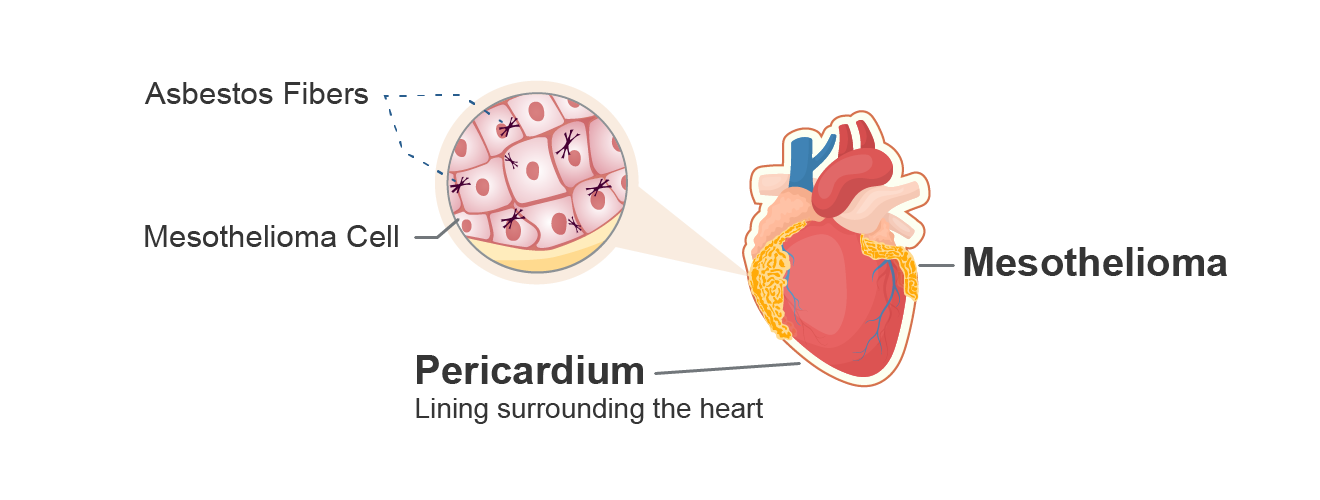What Is Pericardial Mesothelioma?
Malignant pericardial mesothelioma cancer forms in the pericardium, the sac-like lining surrounding the heart. It is the rarest type of mesothelioma and the most difficult to treat.
However, it’s important to stay hopeful after a pericardial mesothelioma diagnosis. Doctors can help you get treatments needed to ease symptoms and potentially live longer.
Key Facts on Pericardial Mesothelioma
- Accounts for less than 1-2% of all mesothelioma cases
- Only 350 cases have ever been reported
- Symptoms include a cough, shortness of breath, chest pain, and heart failure
- The median survival time is 2-6 months
Get our Free Mesothelioma Guide to see how we can assist you or a loved one in finding top treatments, doctors, and financial compensation.
Causes of Pericardial Mesothelioma Cancer
The only known cause of pericardial mesothelioma (and all other types of this cancer) is exposure to asbestos.
Asbestos was used in thousands of products like insulation, wires, and pipes until the early 1980s to keep them durable and heat resistant.
If you worked with or around these products, you could have unknowingly breathed in or swallowed asbestos fibers. These fibers can make their way to the heart lining, damaging healthy cells and causing malignant (cancerous) tumors to form.


Who Is at Risk for Pericardial Mesothelioma?
Anyone exposed to asbestos may potentially develop mesothelioma of the pericardium decades later.
Those with the highest risk are:
- Male: Men are more likely to get this cancer, based on a 2023 study published by Chest Journal.
- Middle-aged: Most patients are diagnosed at around age 60, according to a 2023 Modern Pathology study.
- White: The vast majority of pericardial mesothelioma patients are white, as noted in the Chest Journal study.
If you are at risk, make sure to keep a close eye on possible symptoms and see a doctor promptly if any develop.
Pericardial Mesothelioma Symptoms
Symptoms of pericardial mesothelioma typically develop 10-50 years after asbestos exposure.
Pericardial mesothelioma symptoms include:
- Chest pain
- Cough
- Difficulty breathing (dyspnea)
- Fatigue
- Fever
- Heart murmurs
- Irregular heartbeat (arrhythmia)
- Night sweats
- Pericardial effusion (fluid buildup in heart lining)
- Pericardial thickening (calcification of heart lining)
- Shortness of breath
- Unexplained weight loss
Many patients may not have symptoms until the cancer has spread. When patients do have symptoms, they are often vague and may be mistaken for signs of more common cardiovascular disorders.


“With pericardial mesothelioma, some of the symptoms can be chest pain, shortness of breath, and a condition called atrial fibrillation, where the heart is not beating correctly because of the constricting disease in the lining of the heart.”
Getting a Pericardial Mesothelioma Diagnosis
If pericardial mesothelioma is diagnosed before the cancer spreads, patients may have a more favorable prognosis.
Your doctor will begin by reviewing your medical history and conducting a physical exam. If they think you may have cancer, they’ll order imaging scans to look for potential masses or tumors.
Imaging scans for mesothelioma of the pericardium include:
- Computed tomography (CT) scans
- Echocardiograms
- Magnetic resonance imaging (MRI) scans
- Positron emission tomography (PET) scans
If cancer is still suspected after these scans, doctors will order a biopsy. This is the only way to confirm a mesothelioma diagnosis. With a biopsy, a surgeon removes a fluid or tissue sample and then has a pathologist examine it under a microscope to determine if there’s cancer present.
Doctors may also use immunohistochemistry tests to “stain” biopsy samples to look for substances found only in cancer cells. These staining tests can help make sure the diagnosis is correct.
Call (866) 608-8933 now if you or a loved one has signs of pericardial mesothelioma. Our team can help you find top doctors for an accurate diagnosis.
How Is Pericardial Mesothelioma Misdiagnosed?
Because pericardial mesothelioma is incredibly rare and shares symptoms with many other health conditions, it’s not uncommon for it to be misdiagnosed.
Pericardial mesothelioma may be misdiagnosed as:
- Cardiac tamponade (compression of heart due to fluid buildup)
- Coronary heart disease
- Heart failure
- Other cancer tumors that have metastasized to heart lining
- Pericardial cyst
- Pericarditis (inflammation of heart lining)
- Pleural mesothelioma
A misdiagnosis can be incredibly dangerous, as it can keep you from getting the right treatments for your cancer — meaning your cancer could worsen.
Getting a Second Opinion
To avoid a pericardial mesothelioma misdiagnosis, you should get a second opinion from a cancer specialist.
Through a second opinion, another doctor will review your imaging scans and test results to confirm if you have pericardial mesothelioma. Once you have an accurate diagnosis, you can start treatment with peace of mind.
Use our Free Doctor Match to find specialists who can help diagnose and treat pericardial mesothelioma.
What Is the Prognosis for Pericardial Mesothelioma?
Pericardial mesothelioma has the poorest prognosis, or overall health outlook, of any type of this cancer.
Pericardial mesothelioma prognosis is measured by:
- Life expectancy: The overall life expectancy for pericardial mesothelioma is 2-6 months.
- Survival rate: The 1-year pericardial mesothelioma survival rate is 22%, meaning roughly 2 in 10 patients are still alive a year after diagnosis.
However, there are always exceptions to these averages. Factors like your mesothelioma stage, cell type, and overall health can all affect your life expectancy.
Getting promptly diagnosed and treated may help improve your prognosis. If doctors can catch the cancer in an early stage, it may respond better to treatment, meaning you could live longer.
Pericardial Mesothelioma Treatment
Doctors can use several mesothelioma treatments to help you or a loved one fight this cancer. Surgery, chemotherapy, and radiation therapy may all be used together in a multimodal treatment plan for the best results.
Learn about different treatments for mesothelioma of the pericardium below.
Pericardial Mesothelioma Surgery
A 2024 report in the medical journal Circulation noted that most pericardial mesothelioma patients receive surgery to help manage their symptoms.
There are two main surgeries for pericardial mesothelioma:
- Pericardiectomy: Removes all or part of the heart lining
- Tumor resection: Extracts the mesothelioma tumor
According to a report from The Annals of Thoracic Surgery, tumor resection can be used to help early-stage patients live longer, while a pericardiectomy is mainly a palliative (pain-relieving) procedure.
Get our Free Mesothelioma Guide to learn more about surgeries and other treatments that could help you or a loved one live longer with pericardial mesothelioma.
Chemotherapy
Some cases of pericardial mesothelioma respond well to chemotherapy. This type of treatment circulates cancer-killing drugs throughout the body to destroy mesothelioma cells.
Common chemotherapy drugs for pericardial mesothelioma include:
- Carboplatin
- Cisplatin
- Gemcitabine
- Pemetrexed
- Vinorelbine
A study published in Clinical Lung Cancer found patients treated with chemotherapy lived 13 months on average.
Radiation Therapy
Radiation therapy uses high-energy beams to target mesothelioma tumors and kill cancer cells.
In a 2022 study from the Journal of Thoracic Oncology, 80% of pericardial patients who lived longer than 1 year received radiation as part of multimodal therapy (where two or more treatments are combined).
Palliative Treatments
Palliative care focuses on symptom relief, increasing quality of life and well-being.
Palliative treatments for pericardial mesothelioma include:
- Pain management: Used to help manage cancer symptoms and treatment-related side effects
- Pericardial windows: Similar to a pericardiocentesis but instead cuts a hole in the heart lining to drain excess fluid
- Pericardiocentesis: A minimally invasive procedure that uses a needle to drain fluid from the heart lining, which eases pressure and pain
Those in the advanced stages of pericardial mesothelioma may greatly benefit from palliative care, especially if they aren’t a candidate for surgery due to cancer spread.
Clinical Trials and New Treatments
Clinical trials are exploring new and more effective treatment options for pericardial mesothelioma.
Pericardial mesothelioma treatments being studied include:
- Angiogenesis inhibitors: These drugs block the growth of blood vessels in cancerous tumors. Without enough blood, tumors can’t grow.
- Gene therapy: This involves changing, removing, or adding genes to a patient to fight pericardial mesothelioma.
- Immunotherapy: Drugs train the body’s immune system to target and kill mesothelioma cancer cells. Immunotherapy helped a pericardial mesothelioma patient whose cancer had spread to the peritoneum (abdominal lining) in a 2024 study published by Internal Medicine.
- Photodynamic therapy: Using a drug to make cancer sensitive to light, then applying the light to shrink tumors.
- Targeted therapy: Specifically attacks cancer cells with less damage to healthy cells. A 2023 study in Case Reports in General Cardiovascular Medicine noted that a pericardial mesothelioma patient who received targeted therapy and chemotherapy lived for 1 year.
Ask your doctor about these newer treatments to see if they could work for your case.
Top Pericardial Mesothelioma Specialists
The best doctors for pericardial mesothelioma are those who treat cancers that affect the heart and thoracic (chest) cavity.
One notable pericardial mesothelioma specialist is Dr. Raphael Bueno. He leads the International Mesothelioma Program at Brigham and Women’s Hospital in Boston and has decades of experience. He also treats pleural and peritoneal mesothelioma.
Other doctors familiar with pericardial mesothelioma include:


Dr. Ilya M. Karagodin
Endeavor Health Medical Group, Illinois


Dr. Hari R. Mallidi
University of Miami Miller School of Medicine, Florida


Dr. Valerie Rusch
Memorial Sloan Kettering Cancer Center, New York


Dr. Marjorie Zauderer
Westchester Medical Center, New York
Since pericardial mesothelioma is so rare, you need to work with doctors who have experience treating this cancer.
Use our Free Doctor Match to connect with top mesothelioma specialists. It only takes a few seconds to get started.
Pericardial Mesothelioma Cancer Centers
Cancer centers across the country have specialized teams equipped to treat pericardial mesothelioma.
Notable cancer centers for pericardial mesothelioma include:
75 Francis Street
Boston, MA 02115


Memorial Sloan Kettering Cancer Center
1275 York Ave
New York, NY 10065


Westchester Medical Center
100 Woods Road
Valhalla, NY 10595
By getting care from a facility that treats cancers of the heart and chest, you can rest assured knowing you’ll get the best treatments available.
Pericardial Mesothelioma Treatment Costs & Compensation
The average cost to treat mesothelioma is around $400,000. Even with insurance, you and your family could face expenses like lost wages, travel costs, and medical copays.
Mesothelioma Hope can help you and your family afford the care you need after a peritoneal mesothelioma diagnosis.
Work with our team to pursue compensation from:
- Mesothelioma lawsuits: You may be able to take legal action by filing a lawsuit against the makers of the asbestos products you were exposed to. These lawsuits award $1 million or more on average.
- Asbestos trust funds: These trusts were set up by bankrupt asbestos companies to pay victims. There’s over $30 billion in these funds today.
- Veterans benefits: If you developed pericardial mesothelioma after military service, you may qualify for benefits worth nearly $4,000 a month from the U.S. Department of Veterans Affairs (VA).
Contact us now for help accessing financial compensation after a pericardial mesothelioma diagnosis.
Pericardial Mesothelioma Settlements
Mesothelioma Hope has partnered with Simmons Hanly Conroy, a top mesothelioma law firm, to help patients get the justice and financial compensation they deserve.
The firm has secured over $9.6 billion for mesothelioma patients through out-of-court settlements and trial verdicts.
Pericardial mesothelioma settlements obtained by our legal partners include:
- $1.36 million for a tanker driver in Virginia with pericardial mesothelioma
- $1.2 million for an Alabama truck driver with pericardial mesothelioma
- $1 million for a medical writer in Pennsylvania with pericardial mesothelioma
While there are no guarantees, you may also be able to access compensation by working with our partner attorneys.
Find Hope and Support for Pericardial Mesothelioma
While facing pericardial mesothelioma can feel isolating, you aren’t alone in your cancer journey. The entire Mesothelioma Hope team will walk with you through your diagnosis and offer support every step of the way.
Work with our Patient Advocates to:
- Find top doctors and cancer centers who can treat you
- Pursue financial compensation to cover medical bills
- Receive the support you need while fighting mesothelioma
Call (866) 608-8933 or get our Free Mesothelioma Guide to see how we can help you or a loved one.
Mesothelioma of the Pericardium FAQs
What is the cause of pericardial mesothelioma?
The only known cause of pericardial mesothelioma is asbestos exposure. You or a loved one could develop pericardial mesothelioma 10-50 years after exposure to asbestos.
Contact us now to get help if you worked with or around asbestos and now suffer from mesothelioma.
How rare is pericardial mesothelioma?
Pericardial mesothelioma is incredibly rare, accounting for less than 1-2% of all mesothelioma cases. Only 10-15 new cases are reported each year.
If you’ve been diagnosed with mesothelioma of the pericardium, don’t give up hope. Doctors can recommend treatments that may help you live longer.
How long can you live with pericardial mesothelioma?
The average pericardial mesothelioma life expectancy is 2-6 months, but getting diagnosed before the cancer spreads and promptly starting treatment could help you live longer.
Call (866) 608-8933 to find treatments to improve your survival after a pericardial mesothelioma diagnosis.
Has anyone survived pericardial mesothelioma?
Yes. Some people have survived for several years after being diagnosed with pericardial mesothelioma with the right treatments.
For example, a 2022 Translational Lung Cancer Research study reported on a woman who lived 2.5 years with this cancer. You may be able live longer depending on how your body responds to treatment.
Can you cure pericardial mesothelioma?
Pericardial mesothelioma doesn’t have a cure yet. However, treatments like surgery, chemotherapy, and radiation could improve your prognosis and quality of life.







